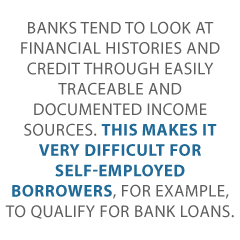
Private Business Lenders
What are Private Business Lenders and Private Business Funding?
Real estate investing is big money. But not every entrepreneur qualifies for loans from big banks, and other traditional sources. Not to worry, there are private lenders out there, willing to lend money. Private money business loans just might be the solution you’re looking for – from private business lenders.
What are Private Business Lenders?
Private business lenders are generally funded by investors, or by banks, or both. Private lenders are in the business of taking funds from private investors. They make private business purpose loans with those funds.
Investors expect a decent return from their investments, and interest rates from money borrowed from banks is significantly higher, than the banks are being charged for the funds. These factors raise the private lender’s expenses. Those expenses are then passed on to the ultimate borrower. Unlike with angel investing or venture capital, the borrower isn’t giving away a percentage of ownership.
Why Work with Private Business Lenders?
Apart from possibly not qualifying for traditional lending, there are other reasons why it may be better to work with a private lender. Banks are often tougher to deal with than private lenders. Banks are subject to significant state and federal regulations. They must work within governmental and quasi-governmental agency programs, like Fannie Mae, Freddie Mac, the VA, and HUD. These regulations often dictate which businesses a bank can lend to, and what borrower profiles should look like.
Private business lenders, while still subject to state and federal laws, are significantly less regulated. They can be more flexible in the types of loans they make, and who their customers are.
Hence is it generally easier to get approval from a private lender, versus a traditional bank. Private lenders can customize each loan based on a set of internally set criteria, like credit scores, loan to value ratio, and debt to income levels.
Learn business loan secrets and get money for your business.
Bank Approvals are Different
In contrast, bank approvals are program or computer driven. The lender only has a little discretion. Private lenders tend to take a more common sense approach, to understanding borrower issues and overcoming them.
Banks tend to look at financial histories and credit through easily traceable and documented income sources. This makes it very difficult for self-employed borrowers, for example, to qualify for bank loans.
Private lenders will be more creative, and investigative in qualifying income. They may be willing to overlook background flaws upon explanation. See rehabfinancial.com/real-estate-investment-strategy/financing-real-estate-investments/private-lender-vs-a-bank-mortgage.
Consider Private Lenders and Hard Money Loans
A hard money loan is a type of real estate loan. It is issued by a private lender for non-owner occupied property. Hard money loans are usually short term. They tend to be between six and 36 months. They have a higher interest rate than traditional bank loans.
Let’s look at Hard Money Loan Approvals
You get approval for hard money loans based on the value of the real estate, rather than the creditworthiness of the borrower. These loans are often used because they have an exceptionally fast approval time. They are often closed within two to four weeks.
What is the Difference Between Hard Money Loans and Bank Loans?
The main difference is the lender. Hard money loans are almost always given by a private lender. This is so whether that’s an individual or a private lending company. These loans are used for non-owner occupied real estate. So they aren’t regulated like consumer mortgages. As a result, hard money lenders can charge higher interest rates and fees, and they can get away with terms that wouldn’t be allowed with traditional loans.
The Truth in Lending Act (TILA) and Real Estate Settlement Procedures Act (RESPA) don’t often apply to commercial mortgages. But there are still regulations traditional financial institutions must follow. Federally insured banks are still regulated by the FDIC. Credit unions are regulated by the National Credit Union Administration (NCUA). But hard money lenders don’t have any regulations placed on them.
What Sorts of Real Estate is Covered by Private Money Financing?
A hard money lender may loan on any type of non-owner occupied real estate. This includes all sorts of real estate investments. But they’re often looking for situations with a fairly quick exit strategy, so they know they’ll get paid by the end of the loan term.
Let’s look at Private Small Business Loans for Fix and Flip Properties
Hard money loans are very common with fix and flip properties. In fact, many lenders will even finance the repairs. These types of deals are ideal for the lender because flips tend to be completed within six months.
If the lender is also financing the repairs, they will estimate the cost of the repairs, and issue draws as the borrower needs them to pay for the work being done. This ensures the funds are being used for the repairs. It also limits the lender’s exposure, since they’re only giving out a small amount of money at a time.
Learn business loan secrets and get money for your business.
Check out Hard Money for Repairs
Many hard money lenders prefer to finance the repairs. This way, they know the project will be completed. If the borrower gets through the demolition and runs out of money, the value may become less than the purchase price. By financing the project, they don’t have to worry about the borrower not being able to finish the job due to a lack of funds.
Consider Hard Money for Rentals
Hard money lenders will also provide short-term loans for residential real estate investment properties. The goal here is often to refinance the property in 12 to 36 months, to be able to pay off the hard money loan. Investors may use a hard money loan for a rental property if they need to be able to close the deal quickly, and don’t have the time to go to a bank. Or they may need a private loan if the rental property needs repairs before a bank will finance the deal.
Let’s look at Hard Money for Multifamily Properties
Like loans for rental properties, investors may need capital quickly to close on a multifamily property. This is the case if there’s not enough time to go through the traditional lending process. Private money lending is just plain faster.
An investor may also be buying a multifamily property with little to no tenants that needs a lot of repairs. This type of property would be hard to get financed with a bank, so they may seek out a hard money loan. Investors can get the necessary work done. And they can lease the property before refinancing it with a long term loan.
Consider Hard Money for Commercial Real Estate
A common situation with commercial real estate is an investor having a tenant to lease space to, but no property to put them in. The investor will find a vacant property that the tenant will lease out, but they have to buy the property and get it ready for the tenant first.
A bank may not want to finance a vacant property intended for use as an investment if the borrower doesn’t have the assets to secure the loan. A hard money loan can be useful in this situation to get the deal done. The investors can accomplish the tenant improvements and get the property leased. Once the tenant is in place and paying rent, a bank will be more willing to finance the real estate.
Check out Interest and Fees on Hard Money Loans
The convenience and easy approval with a hard money loan comes at a cost. Lenders will charge higher interest on hard money loans. This is because they are higher risk loans. It is also because these loans are short term.
Longer term loans will earn interest for several years from processing one loan. But the money invested in hard money loans must be reinvested every six to 36 months. There’s added cost and new risks each time that money is invested in a loan. Interest rates for these loans tend to be a few percentage points higher than traditional bank loans.
Learn business loan secrets and get money for your business.
Check out Hard Money Fees
The lender will charge upfront fees to cover the cost of processing the loan, plus any commissions being paid. This also ensures they still earn a profit; in case the borrower pays off the loan before the end of the term.
Common fees for a hard money loan include origination fee, broker fee, application fee, underwriting fee, document prep fee, processing fee, and funding fee. These fees can add up to thousands of dollars.
Consider Credit Checks and Property Values
In general, private lenders are going to be all right with average credit. Their main concern is the value of the property. Plus a lender wants to know the market the property is in. This is due to higher risk. The lender wants to be able to recover their costs in case of foreclosure. See fool.com/millionacres/real-estate-financing/hard-money-loans/5-best-hard-money-lenders.
More Details on Private Small Business Loans and Hard Money Loans
There is a balloon payment at the end of the short term. For fix and flip, the lender knows the borrower can afford the balloon payment. But in the case of a borrower looking to refinance the property by the end of the term, the may not be as willing to lend to someone with bad credit. They will look closer at the borrower’s credit and personal finances in this case. The lender may also require a higher down payment to limit their risk in case the borrower can’t pay the lender off at the end of the term.
Private lenders for business loans will look into a borrower’s experience. For a fix and flip, private business lenders will want borrowers who have completed at least a few other deals. Smaller lenders usually stick to markets they know and states that have a strong real estate market. They often don’t like rural properties and provide a lower loan to value for them.
Private Money Financing: Takeaways
Private money financing is a way for real estate investors and house flippers to get funding. Also called hard money loans, private money financing tends to have fast approvals, but higher interest rates and no regulation to speak of. Experienced flippers in urban areas with good real estate markets are more likely to get approval.
The post Private Business Lenders appeared first on Credit Suite.
